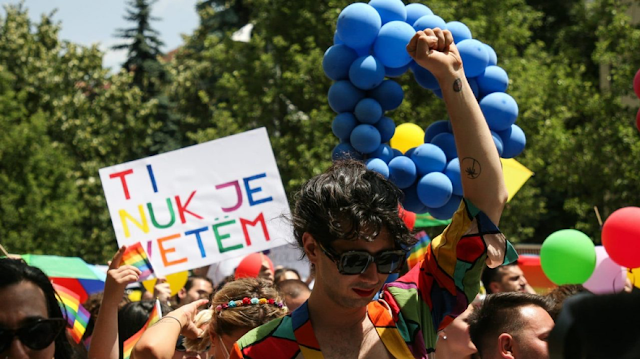By Ema Torcato
Today (Tuesday 17 June) we had the chance to talk with Arber Nuhiu and Rajmonda Sylbije from the Center for Social Group Development (CSGD) in Kosovo. In the days prior to the Zoom meeting, I had read a lot about the organisation and what it stood for. I learned that it was the first LGBTI NGO in Kosovo, established in 2003 by Arber Nuhiu. I was expecting to hear about their activism, the usual kinds of community programs, and maybe some of the legal work they do. But I didn’t expect to be so personally impacted by the conversation.
CSGD focuses on four main areas: empowerment, awareness, advocacy, and HIV prevention services for LGBTI individuals in Kosovo. Their work covers legal aid, psychological support, public awareness campaigns and fighting for policy changes, especially around legal gender recognition, marriage equality and access to justice.

But more than a list of activities, what came through in the conversation was the weight of time. We got to truly see just how long and slow advocacy work really is, and how much effort it takes to move things along. Arber walked us through the years they’ve spent pushing for change, and how frustrating it can be when progress is met with resistance. Arber talked to us about the different moments over the past two decades, when they’ve tried to push for policy reform or greater protections for the community, and how often those efforts have been met with silence, delays, or flat-out rejection. He mentioned the lack of political will from those in power. Not just indifference, but at times outright hostility, with public figures openly engaging in hate speech, using their platforms to spread harmful narratives about queer people. Hearing that was honestly a gut-punch. It’s one thing to know that change is slow; it’s another thing to see how deeply people can resist it. And yet, CSGD is still showing up.

The part of the conversation that has stuck with me more than anything else was when Rajmonda mentioned the lack of queer women taking the lead in activism in Kosovo today. At AUC I’ve always learned that intersectionality is a key part of meaningful social justice work, acting as a lens through which we understand how different forms of oppression are compounded. As a queer woman myself, I felt it was quite important for intersectionality to be used in these contexts, especially at a time when there’s a clear lack of political will to make concrete changes toward a more inclusive environment and stronger rule of law. What Rajmonda said really made me think about how often queer women are side-lined, even within LGBTQ+ spaces. When their voices and experiences aren’t centred, it becomes easy for their specific challenges to be overlooked. That conversation made me reflect on my own role in activism, too. Hearing about these struggles first-hand reminded me that I want to use my own identity more intentionally to speak up and support others as well.
The conversation left me thinking about how we measure success in movements like this. CSGD has done so much. It has opened a drop-in centre visited by thousands, held trainings, joined international events, provided medical and psychological care, and built bridges among queer people across ethnic divides. And yet, Arber still described the community as not fully developed. That was hard to hear. I think it made me realise nothing is ever truly accomplished and the work is never “done” when the structures we’re up against are deep and ongoing.
The conversation left me thinking about how we measure success in movements like this. CSGD has done so much. It has opened a drop-in centre visited by thousands, held trainings, joined international events, provided medical and psychological care, and built bridges among queer people across ethnic divides. And yet, Arber still described the community as not fully developed. That was hard to hear. I think it made me realise nothing is ever truly accomplished and the work is never “done” when the structures we’re up against are deep and ongoing.
But, surprisingly, this didn’t make me feel hopeless. By the end of the call, I felt mostly inspired. Not by some abstract idea of activism, but by the real work CSGD does, and particularly their persistence. By the fact they haven’t given up, even when the odds are stacked against them. I left the meeting thinking about how I can use my own voice, my identity and my privilege more intentionally. They reminded me that change isn’t always loud. Sometimes it’s quiet, exhausting, slow, but still necessary.
And sometimes, just being there, still doing the work, is the most radical thing you can do.


No comments:
Post a Comment